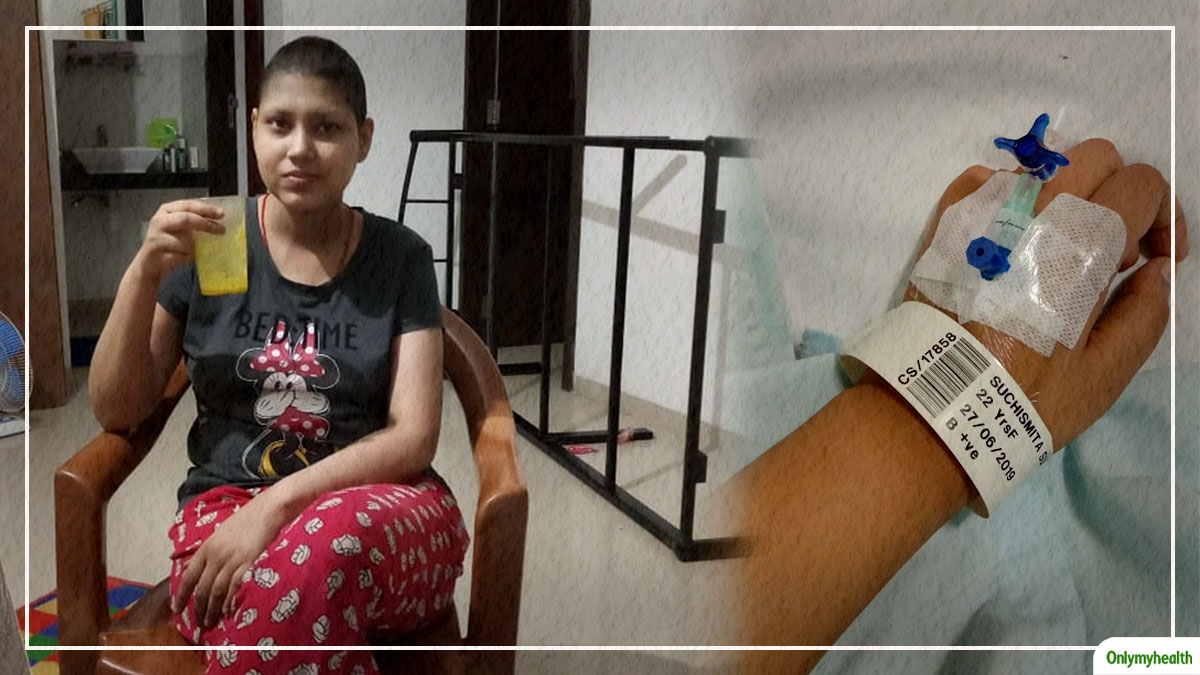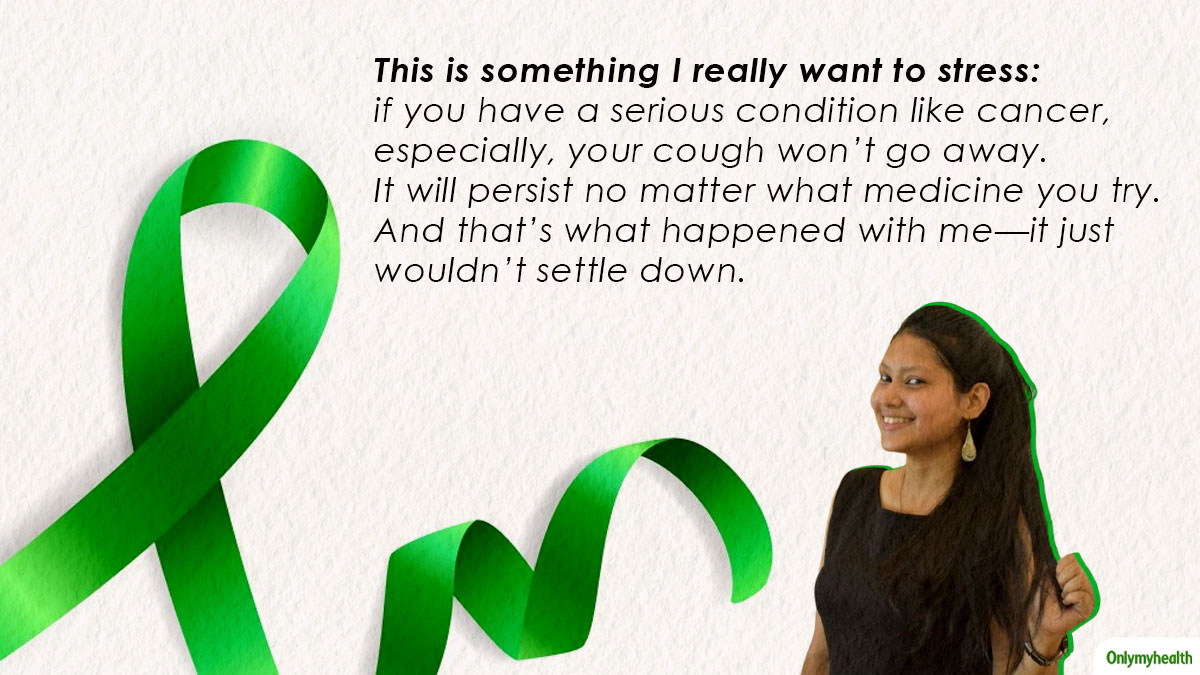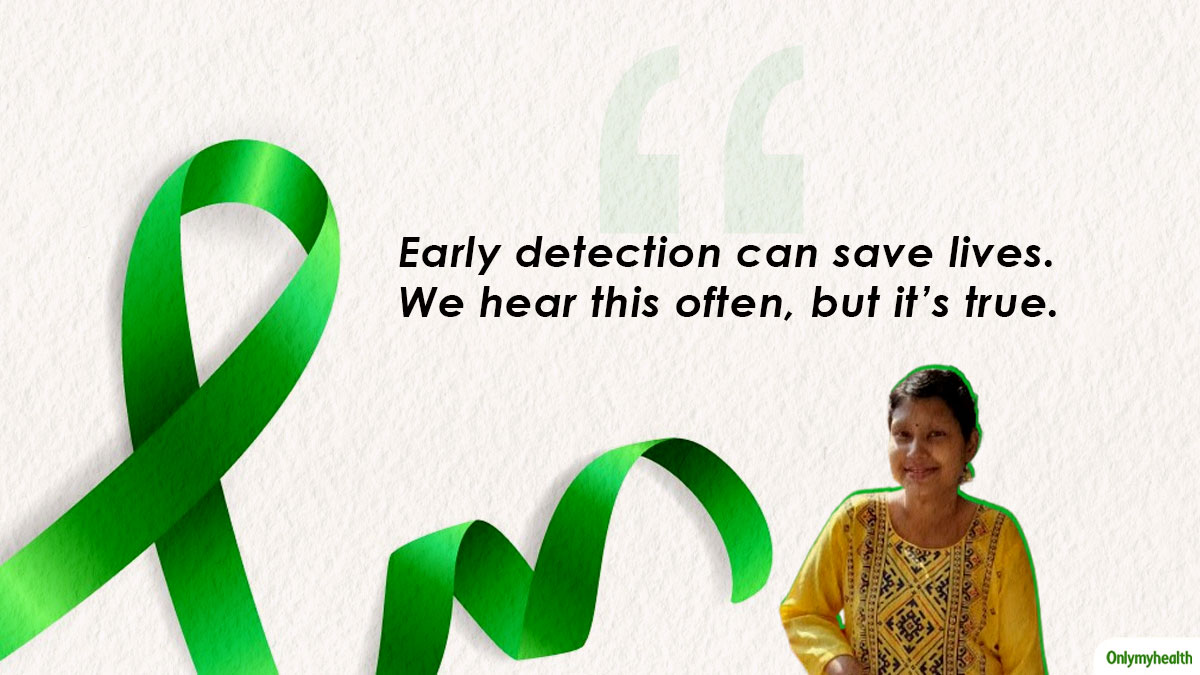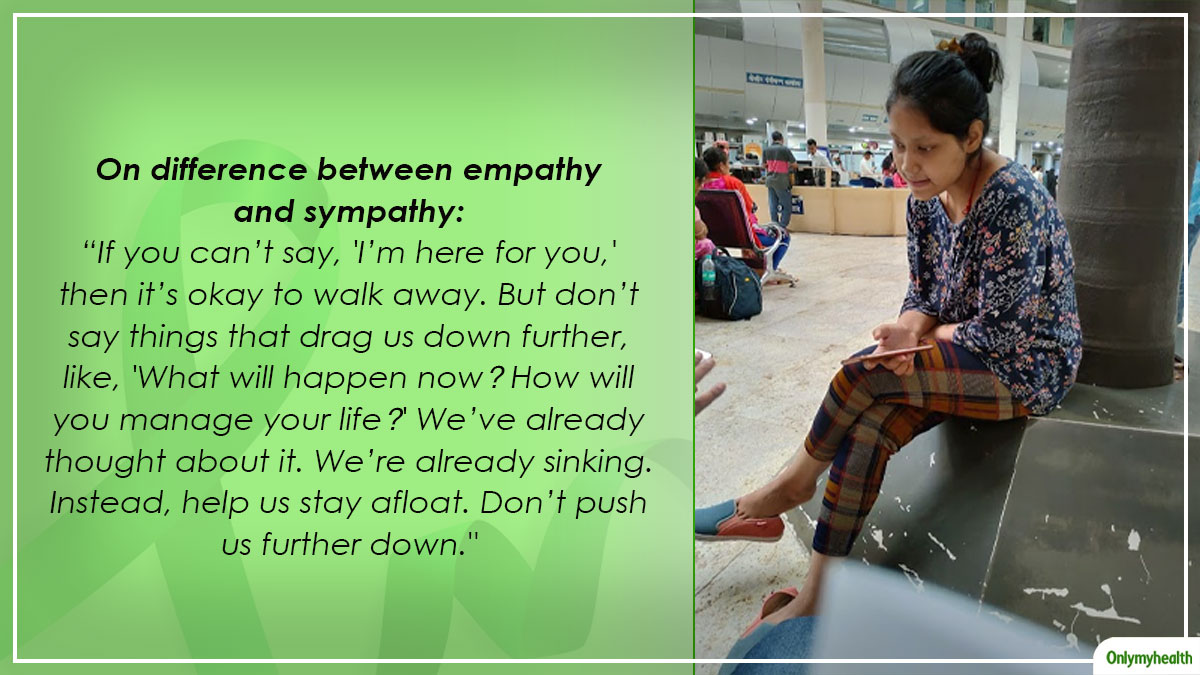
Age and lifestyle choices are known to influence cancer risk. However, it's important to remember that cancer doesn't always follow the expected path, as was the case for Nagpur-based Suchismita Das. At just 22 years old, this aspiring engineer had to leave her studies midway, as she was diagnosed with a rare cancer called alveolar rhabdomyosarcoma, despite being young and a non-smoker. Today, she is cancer-free and has completed her studies, but she continues to advocate for awareness, early screening, and works to gather support for others affected by cancer.
Table of Content:-
On National Cancer Awareness Day 2024, in a heartfelt conversation with OnlyMyHealth, Suchismita reflected on her unique journey through cancer. Not only did she share the lessons she wished she’d known at the start of her battle, but she also provided insights she hopes can offer strength and guidance to others facing similar challenges.
Cancer At 22: A Rare, Unexpected Journey

For Suchismita Das, it all began with a cough that simply wouldn’t go away. Many people might brush off a persistent cough as something benign—a common cold, an allergy, or at worst, a sign of tuberculosis. But for Suchismita, it signalled the start of something far more serious.
“Basically, I was in my second year of engineering, around 21, almost 22 years old, when I first noticed some symptoms. They weren’t alarmingly severe, but they were definitely there. It wasn’t asymptomatic—I was coughing frequently, and climbing stairs up to the third floor became incredibly hard. I’d feel completely drained by the end of each day,” she recalled.
Then she added with emphasis, “This is something I really want to stress: if you’re dealing with a serious condition like cancer, especially, your cough just won’t go away. It will persist, no matter what medicine you try. That’s what happened to me—nothing made it better, and it just wouldn’t settle down.”
After visiting a doctor, she was advised to get an X-ray and ultrasound. The results revealed a hazy shadow in her lungs, calling for a more specialised approach.
“We went to a larger hospital, where they ran more tests, including a biopsy. The doctors confirmed it was cancer, but they also noted that it was a rare type. They suggested that the best places for my treatment were two top hospitals in India. Since I was already in Maharashtra, Tata Memorial Hospital in Mumbai was the most convenient option,” Suchismita explained.
After further tests and screenings, her diagnosis was officially confirmed: alveolar rhabdomyosarcoma (RMS), a rare type of cancer that can affect different parts of the body. For Suchismita, it had taken root in her lung.
This moment marked the beginning of a journey that would require all her courage, and today, her story serves as a reminder of the importance of never ignoring persistent symptoms and advocating for one’s own health.

Understanding Alveolar Rhabdomyosarcoma Through A Doctor’s Lens
Rhabdomyosarcoma (RMS) is a rare type of cancer that targets bones or soft tissues, and for Suchismita Das, it was the latter. “Mine was a soft tissue cancer,” she explained. Her specific diagnosis, alveolar RMS, is a form of RMS that tends to be more aggressive and is most often found in the large muscles of the trunk, arms, and legs.
In an interaction, Dr Vibhor Sharma, Senior Consultant and Head of Bone Marrow Transplant and Medical Oncology at Asian Hospital in Faridabad, elaborated on ARMS, stating that while it’s most prevalent among older children and adolescents, it can affect people of all ages. According to the National Cancer Institute (NCI), the occurrence of alveolar RMS remains consistent across both sexes and affects roughly 1 in 1 million children and adolescents aged 0 to 19. Dr Sharma highlights that ARMS typically grows faster than its counterpart, embryonal rhabdomyosarcoma (ERMS), which is more common in infants and younger children.
For Suchismita, the cancer affected her lungs, a diagnosis that came as a shock, especially as a non-smoker. Her doctors concluded that the cause was likely genetic. "But just because mine was linked to genetics doesn't mean everyone with a family history will develop it," she pointed out, eager to clear up common misconceptions around her diagnosis.
“A big misconception I wanted to address is the belief that lung cancer only happens to smokers or those exposed to secondhand smoke. In my case, that wasn’t true at all. In fact, current research shows more young, non-smokers are being diagnosed with lung cancer,” she said. This realisation drove her to document her journey on social media—to emphasise that lung cancer isn’t solely a “smoker’s disease” anymore. “If you have lungs, you can get lung cancer.”
Dr Sharma underscored the need to understand the distinction between ARMS and lung cancer. While ARMS can affect the lungs, it’s not the same as primary lung cancer. “ARMS is a type of soft tissue cancer that originates from skeletal muscle cells and can metastasise to the lungs,” he explained. “Lung cancer, on the other hand, originates in the lung itself. Both are serious, but they have different origins and treatments.”
Suchismita’s story serves as a powerful reminder that cancer doesn’t always follow expected patterns, and raising awareness about its nuances could help many recognise the signs early, regardless of age or lifestyle.
Also Read: Anupam Kher Calls Mahima Chaudhary ‘Hero’ As She Opens Up About Her Breast Cancer Battle
A Fighter’s Advice: Early Detection Saves Lives

Many people fear cancer, and understandably so. But the real question is: What are you doing to minimise that fear? What steps are you taking to reduce your risk?
Cancer is inevitable and can occur in anyone, but regular screening and early detection can not only assist with suitable treatment options but can also save lives, emphasised Suchismita.
"Most people, unfortunately, are diagnosed at stage four," she continued. "Stage four cancer, at the end of the day, can’t be cured—it can only be controlled. I know people who are living fulfilling lives even with stage four, but it’s not curable." She emphasised, "When there’s a chance of getting cured in the early stages, why not go for it? Early detection can save lives. We hear this often, but it’s true."
Suchismita advocates for regular screening, suggesting, "If not every year, then at least once every two years. And if you’re a smoker or have any addictions, you should definitely get screened regularly."
Reflecting on her own diagnosis, she recalled, "When I was diagnosed, it was still at an initial stage. I hadn’t developed symptoms like coughing up blood, which is common in advanced cases. My main symptom was just persistent coughing."
"Some doctors even thought it might be tuberculosis, which is a common misdiagnosis," she said. "But TB, unlike cancer, eventually gets cured. When traditional treatments fail, that’s when people should consider other possibilities. Unfortunately, there’s still a lot of hesitation around visiting cancer centres due to fear. But going early could save your life."
View this post on Instagram
“Chemotherapy Was The Toughest Part”
According to Dr Sharma, RMS treatment suggestions are based on the location and aggressiveness of the tumour. The treatment's adverse effects and how they may affect appearance and bodily function are also consiered. This is especially true when dealing with youngsters and teenagers, he noted. Surgery for tumours in some parts of the head and neck, hands, feet, or brain is not indicated in order to maintain look and function. Instead, we might treat these tumours with chemotherapy and radiation treatment, the doctor added.
For Suchismita, chemotherapy was the toughest part of the journey. “I’ve gone through 32 cycles—16 at once, then a relapse, and another 16. No matter how many you go through, chemotherapy side effects don’t get easier,” she said, adding that it becomes a challenge to even get out of bed.
“I lost all my hair, which was emotionally very hard. Every time I looked in the mirror, I felt broken. Thankfully, there are organisations that give out free wigs, and I got one from them. But you learn to cope because you don’t have any other choice,” she continued.
Also Read: Sonali Bendre Opens Up About Her Battle With Cancer: I never thought I would Die
Sympathy Vs. Empathy: On Drawing The Line
Being diagnosed with cancer at such a young age could take a toll on anyone. For Suchismita, it was no different. While her family and friends were a pillar of strength and support, she mentioned how it was difficult to cope with people who could not distinguish between what it meant to empathise versus sympathise.
In the hope that others do not go through the same experience, she cited two clear examples that she experienced firsthand: “For instance, we often hear, 'I’m so sorry to hear this happened to you.' Everyone says that, right? And it’s completely understandable, because we don’t always know what to say, and it's valid. But then there’s a difference when one person says, 'Whatever happens, we’re here to support you.' And another person says, 'Okay, but how are you going to get married now? How will you finish your studies?' You can see the difference, right? One person is encouraging you to move forward, saying, 'Let’s see what happens next.' That’s the kind of support we need, because we’re already in a tough place. We’re already struggling. It’s not that we haven’t thought about these things ourselves. We have.”
She added, “If you can’t say, 'I’m here for you,' then it’s okay to walk away. But don’t say things that drag us down further, like, 'What will happen now? How will you manage your life?' We’ve already thought about it. We’re already sinking. Instead, help us stay afloat. Don’t push us further down."

Turning Pain Into Purpose
While many lose hope, for understandable reasons, Suchismita believed that she could help others through her own struggles. She is now working with Lung Connect, an organisation aiming to improve screening access.
"We’re trying to make a difference. We haven’t achieved everything yet, but if you don’t start trying, nothing will ever change," she said, hopeful for the future.
Talking about the organisation, Suchismita shared, "Lung Connect is the first lung cancer NGO in India, and it’s a unique platform because it’s built by patients and caregivers. Our team includes people who are personally touched by lung cancer, such as our lead counsellor, who is a cancer survivor, and our lead caregiving staff, who cares for his wife battling stage four lung cancer. Myself and many others are either survivors or are fighting it, or our families have been affected by it. That’s the core of our mission. Sometimes people doubt us, thinking we don’t understand what it’s like, but when we share that we’ve lived through it, they realise we truly understand."
She continued that the platform also offers regular support group meetings, held six days a week, which include a lung cancer talk by an expert, a session with one or two doctors to answer questions, and importantly, a survivor story. Regarding their mission, they aim to reach out to the Government of India to help reduce the cost of medications.
"Even if you have money, a diagnosis of stage four lung cancer can mean a treatment cost of one lakh per month, which is beyond the reach of many middle-class families. Although the government has started providing some subsidies, it's not enough yet. We’re working on it, but it will take time," she stressed.
Life After Cancer
According to Dr Sharma, follow-up visits are crucial for survivors of alveolar RMS to monitor their recovery and overall health. These visits are typically scheduled every 3 months in the first year, every 4 to 6 months in the second and third years, every 6 months in the fourth and fifth years, and then annually, he highlighted.
Suchismita shared, "I believe regular follow-ups are extremely important. My doctor always emphasises that even if it's just a routine check-up, it’s crucial. Sometimes, even a couple of months can make a difference in catching something early. So I make sure not to miss those."
She further added, "I was first diagnosed in 2019, and I was cancer-free for a while. But then, unfortunately, the disease relapsed, and I had to undergo treatment again. Since the end of 2021, I’ve been doing well. I have regular follow-ups every four months, and they conduct a PET CT scan to ensure everything is fine. If the results are clear, they tell me I can go ahead and continue with my routine, which is reassuring."
As for lifestyle changes, Suchismita now makes it a point to exercise every day. It may not be an intense session, but she tries to lead an active lifestyle. When it comes to food, she accepts that she hasn't made major changes but has become more mindful.
View this post on Instagram
Concluding with a message for those who have just received a diagnosis or those coping with cancer, Suchismita said, "Feeling overwhelmed and emotional is completely normal. It’s a valid reaction, and it's okay to feel that way. One question that often pops up is, "Why me?" And that’s a very natural thought. We’re humans, not robots. It's okay to ask that question. But what’s important is that the very next day, you have to pick yourself up and find the best way to fight. I’m not telling you which hospital to go to, but it’s essential to find the best possible way to approach your treatment. Also, if possible, connect with a support group. It helps to know that you’re not alone. When you meet others going through similar struggles, it can give you strength, knowing they’re managing and doing well."
Also watch this video
How we keep this article up to date:
We work with experts and keep a close eye on the latest in health and wellness. Whenever there is a new research or helpful information, we update our articles with accurate and useful advice.
Current Version